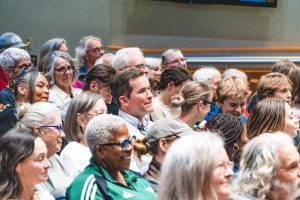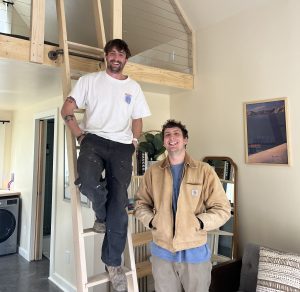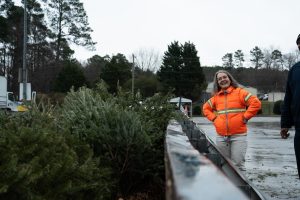Selina Mack nods at the purple and yellow pansies that bloom in front of the tidy Burch Avenue duplex.
“This is important for me, that the yard looks right,” Mack says with a smile. She selected these flowers herself, choosing a variety that could survive through the winter.
It’s a detail that might have gone unnoticed by a less experienced leader, but after 26 years at Durham Community Land Trustees, Mack has developed a keen eye for the little things. Mack recently retired from her job as executive director of the land trust, where she served as its first Black executive director.
Walk through several Durham neighborhoods, and you’ll see evidence of her impact: in land trust homes like the one on Burch Avenue, in safer streets, and in the lives of hundreds of families who have secure places to live.
***
Mack first became involved with the community land trust movement when she became the land trust’s business manager in 1996. Just 18 months later, in March of 1998, she was tapped as executive director. She went to work renovating homes in Durham’s West End neighborhood.
“That neighborhood was very, very different in 1996, with very substandard housing conditions. Crime was rampant,” she said. “And in fact, it was difficult for DCLT to attract people to come live in the houses that we were building or renovating.”
Those circumstances — absentee landlords, boarded-up homes, and unsafe living conditions — led to the genesis of the Durham land trust in 1987. The organization is among the oldest of the United States’ roughly 260 community land trusts.
This shared-equity model of housing represents a different approach to the affordable housing puzzle, one that emphasizes permanent affordability. Land trusts buy the land beneath houses, which keeps home prices substantially below market value. When prospective homeowners purchase or rent a home, they do so with the promise of keeping its price low for the future. Originating during the Civil Rights movement, community land trusts became a powerful way for marginalized communities, particularly communities of color, to establish a sense of self-determination.
Today, the land trust continues to fight to preserve Durham’s racial and socioeconomic diversity. The organization now owns and manages 367 properties scattered across seven neighborhoods: West End, Lyon Park, Burch Avenue, Morehead Hill, Lakewood Park, East Durham, and Southside. In total, it provides affordable homes to more than 250 adults and 125 youths.
“I’m sure there were many times when [Mack] worried about making mortgage payments or payroll, or both, but she got it through,” said Happy Sayre-McCord, the organization’s board president. “And that is the kind of person she is. She is tough and persevering, and DCLT, I am certain, is here today because of those qualities.”
***

As executive director, she pursued partnerships with other community organizations such as Habitat for Humanity and Self-Help, coordinated multiple sources of funding, and kept up contact with residents. Those who worked alongside her praise her work ethic and her down-to-earth personality.
Dan Levine, director of real estate at Self-Help, first met Mack nearly 16 years ago when his organization collaborated with the land trust to develop affordable housing in Southwest Central Durham. He described a sense of “quiet servant leadership” Mack brings to her work.
“She was serious and intense, but she was also really warm and cared a lot about community,” said Levine. “And just a nice person to get to know on a personal level.”
The land trust now manages 130 rental properties in the West End neighborhood, including renovated buildings like the Pauli Murray Place, the solar-powered West Park Apartments, and The Court at Carroll for seniors. During her tenure, Mack led the land trust’s expansion into rental housing to serve very low income people, seniors, and people with disabilities.
Her proudest accomplishment?
“The fact that you can walk out of the front door of DCLT and you can see people, all times of day or night, walking the street, walking the dog, going to the grocery store, just things that you consider normal, everyday things,” she said. “That wasn’t always the case.”
***
Even after nearly three decades, it’s hard for Mack to step back from her work.
“It went by quickly,” she said. “There was always something that I was building, that I was trying to reach, trying to attain. I mean, when you have 10 people a week calling your office saying, ‘I desperately need housing’… you can relate to those stories and those issues. And it drove me.”
Mack remains involved in affordable housing work, consulting for another North Carolina-based land trust. She worries about the future of affordable housing in Durham. The City of Durham estimates that 16,000 more units are needed to meet local affordable housing needs.
“It’s going to be limited,” she said. “While people’s ability to pay for housing hasn’t increased dramatically, the cost of producing housing has increased dramatically. And so we’re able to produce a lot less with the same dollars.”
“So unless there is a tremendous increase in the amount of funding or resources available for affordable housing…there’s no way to even put a dent in that [number].”
In spite of these worries, Mack takes comfort in the fact that more than 300 reduced-cost housing units are here to stay. The organization will continue to maintain and renovate these properties, ensuring that they remain affordable decades from now.
Mack remains in contact with community members that she met through her time at the land trust. She’s watched many of them raise families in the houses her organization helped construct. Within her own family, she’s a doting grandmother to two young grandsons, ages two and 12.
And she’s remained an avid gardener, a fact commemorated in the neighborhood where she spent so many years building community. The Selina Mack Community & Legacy Garden sits on Merrimac Street in the West End. Outside the teal home with royal blue shutters is a small patch of land dotted with bright yellow daffodils. They, too, will survive the winter.
Above (from top): Selina Mack recently retired after nearly three decades leading the Durham Community Land Trustees; a West End garden commemorates Mack’s contributions. Photos by Abigail Bromberger — The 9th Street Journal
Sevana Wenn









